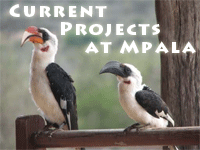Research Permits
With questions pertaining to the research permit application process, consult Mpala Operations Assistant Fardosa Hassan (opsassistant@mpala.org).1. Submit a research proposal to Mpala Research Centre.
- Research proposals are evaluated by the Executive Director and Science Advisory Committee. You must submit this at least 6 months in advance of your proposed research start date.
- Steps and forms can be found here.
If you will export any samples, a KWS authorization letter is required. If you will not be exporting samples, you may apply instead for a KWS affiliation letter.
- You must apply for these letters before arriving in Kenya. You may not begin research until you have your affiliation or authorization letter in hand.
- In order to apply for a KWS affiliation or authorization letter, you need the following:
- Completed application forms, of which there are two:
- Research proposal
- Introduction letter from Mpala Research Centre
- CV (relevant to research project)
- Copy of passport biodata pages
- Send these files to Mpala Operations Assistant Fardosa Hassan (opsassistant@mpala.org), who will forward them to KWS. The KWS letter will be issued upon acceptance of the above documents and receipt of payment. For non-citizens, an affiliation letter costs US $120; an authorization letter costs US $700.
- To apply for an NMK affiliation letter, you need the following:
- Research proposal
- Introduction letter from Mpala Research Centre
- CV (relevant to research project)
- The NMK affiliaton letter is issued upon payment of US $200.
3. Apply for a NACOSTI research permit. Create an account on the NACOSTI website at https://oris.nacosti.go.ke, and follow the guidelines for application, found below:
The NACOSTI fee structure is as follows:
Researchers may also make payments to NACOSTI through Mpala. Please contact the finance office (finance@mpala.org) to do so.
4. Obtain a visitor's visa
- Create an evisa account, apply, and pay online for a 3-month single-entry visitors' visa. Print your evisa and payment confirmation, and bring it with you to the airport. You will receive the visitor's visa stamp in your passport upon arrival.
- You must have your research permit in order to apply for the research pass.
- Receiving the research pass changes your status in Kenya from visitor to researcher
- The application for a research pass can is completed online through the e-Foreign Nationals Service (eFNS) portal, found here.
6. If you are exporting samples, you must additionally obtain a National Environmental Management Authority (NEMA) permit, a KWS export/import permit, and either a certificate from the Kenya Director of Veterinary Services (DVS) for all animal materials or a Phyto-sanitary Certificate from the Kenya Plant Health Inspectorate Services (KEPHIS) for all plant materials.
This applies to the transfer of all wildlife materials/samples, be they genetic or non-genetic, biological or non-biological.
- First, you must fill a Materials Transfer Form and a Prior Informed Consent Form, have these reviewed by KWS, and have them approved by your institution and Principal Investigator. For these forms, please contact Fardosa Hassan (opsassistant@mpala.org).
- Second, once you have obtained these forms, you may apply for a NEMA access permit for genetic resources. The NEMA access permit is a requirement for a KWS export permit application. The NEMA permit application can be found online on the NEMA website (www.nema.go.ke) and will be issued upon payment of KSH 20,000. The NEMA permit must be renewed each year, with renewal costing KSH 10,000.
- Third, once you have obtained the NEMA access permit, you may apply for the KWS import/export permit. This application form may be found here. The export/import/capture permit form must be submitted to the KWS Licensing Office for processing, accompanied by the following documents:
- KWS Research Authorization letter (process described above)
- Materials Import Permit from the country of the materials' destination
- The duly filled in and signed Materials Transfer (MTA) form between KWS and the applicants' institutions (i.e. your university)
- The duly filled in and negotiated Prior Informed Consent (PIC) on the mutually Agreed Terms (MATs) form between KWS and the Principal Investigator (PI)
- The access permit to genetic resources from the National Environment Management Authority (NEMA)
- The research clearance letter from the National Commission for Science Technology and Innovation (NACOSTI)
- A full list of the samples to be exported, listed in a spreadsheet, and including the following information for each sample:
-
- Species name (English and scientific)
- Collection site and GPS coordinates
- Weight
- Progress report on the research
- Any other supporting documents
Live Animal Traps
If bringing live animal traps into the country, you need to first obtain a letter from KWS in order to not have your traps confiscated.
Other Useful Research Documents and Instructions:
Research Permit Guidelines
Template Letter of Support to accompany Research Pass Form
Steps to obtain an Export Permit from KWSWriting a Material Transfer Agreement
KWS Export and Import Application Form
Steps to obtain Phytosanitary Certificate
Phytosanitary Certificate Application Form
*Other documents can be found at:
http://www.immigration.go.ke/


